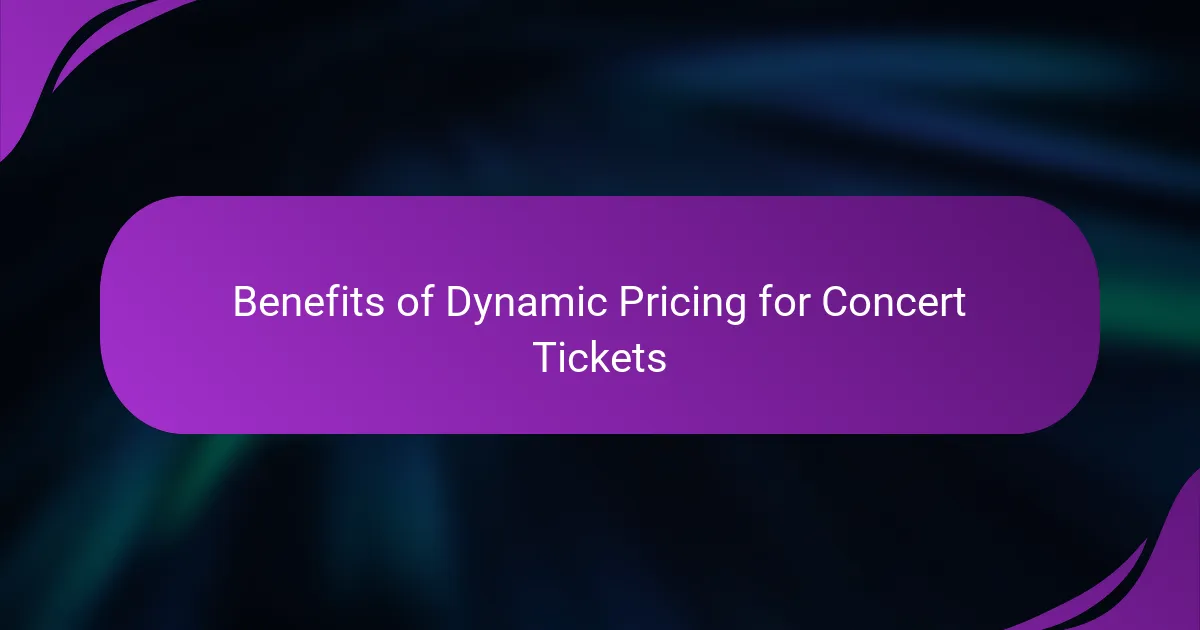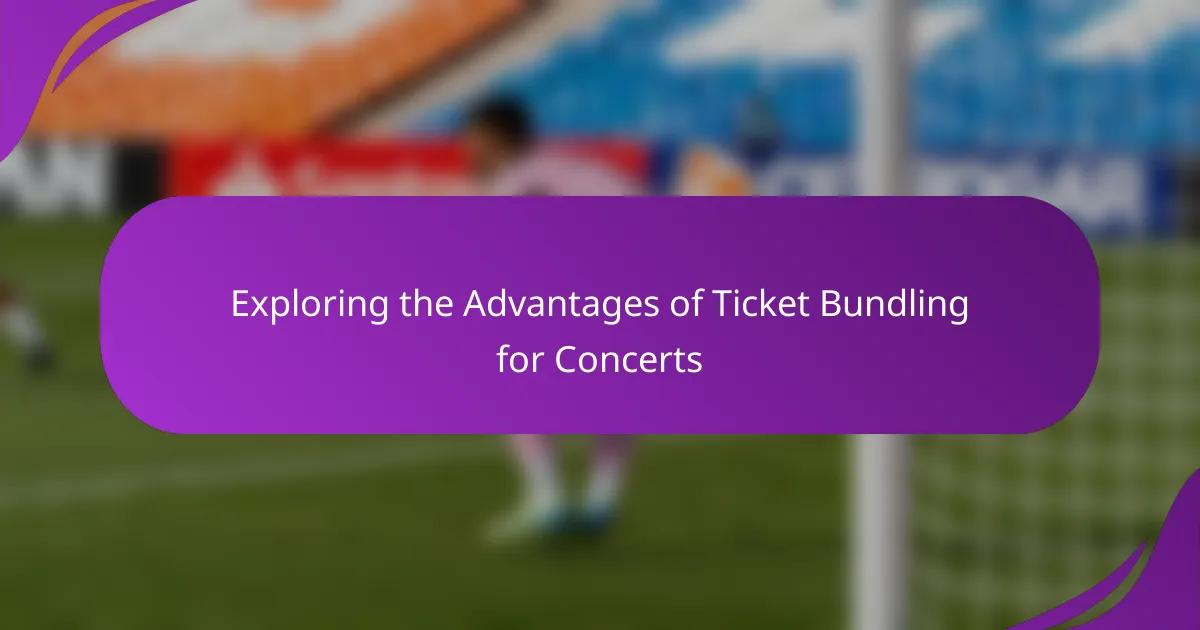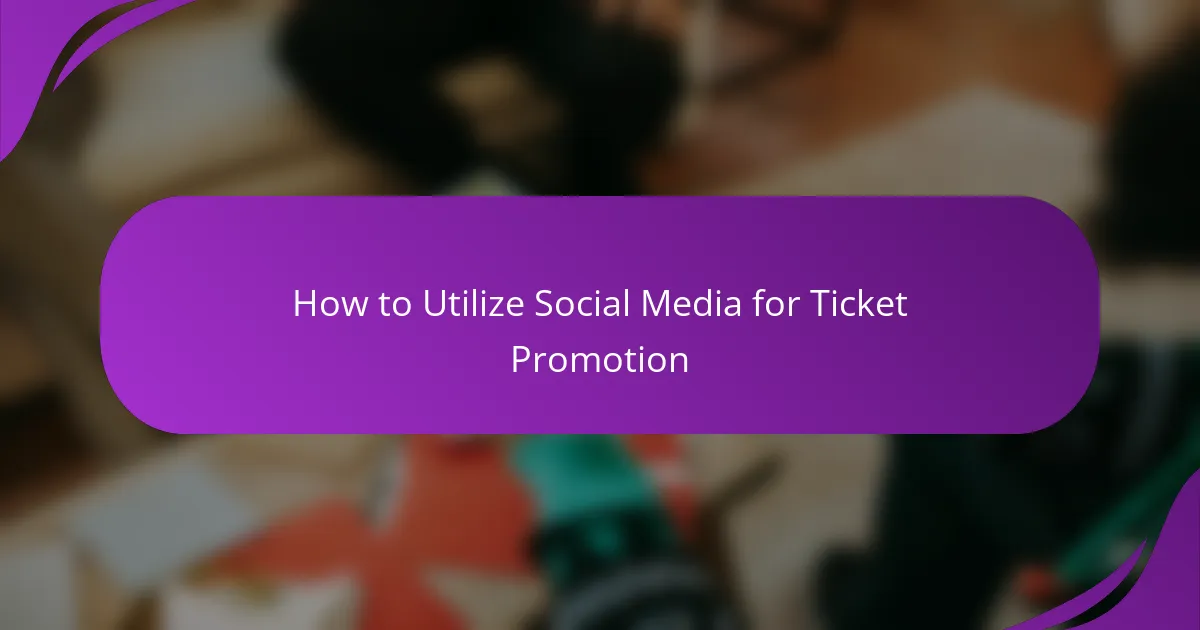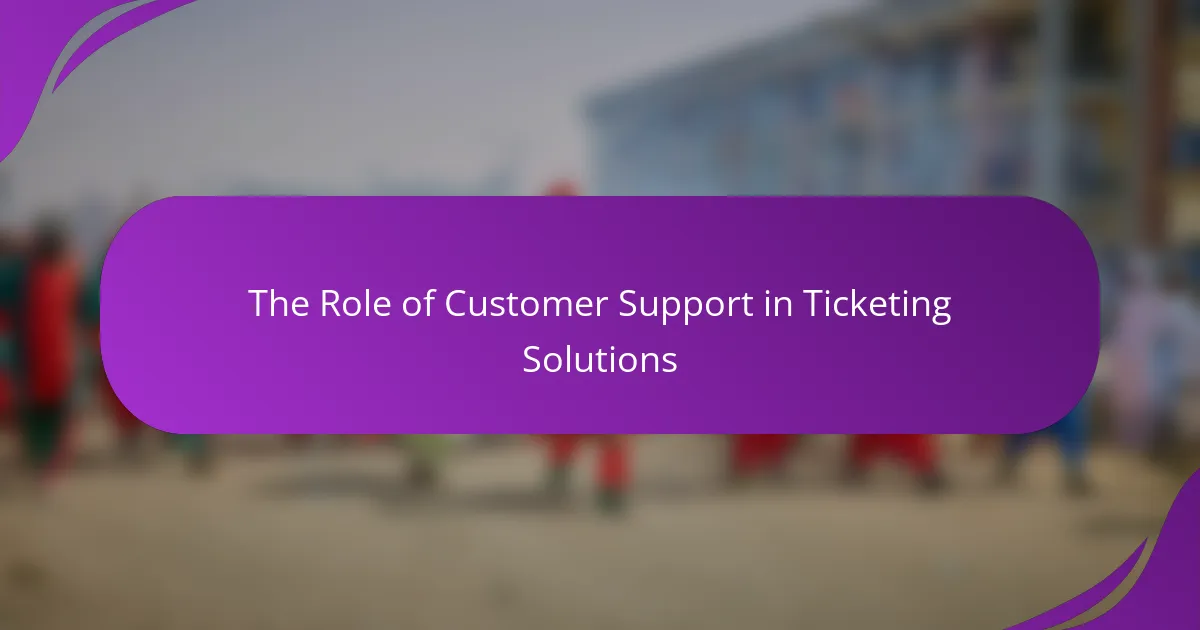Ticketing platforms for concerts are online services that facilitate the sale and distribution of event tickets, allowing users to browse events, purchase tickets, and receive electronic confirmations. Key features of these platforms include seat selection, ticket pricing, payment processing, and promotional tools for event marketing. The article categorizes ticketing platforms into primary, secondary, and mobile types, each serving distinct roles in the ticketing ecosystem. It also addresses significant challenges faced by these platforms, such as ticket fraud, competition, high traffic management, regulatory compliance, and the need for a seamless user experience across devices. This overview provides essential insights into the functionalities, types, and challenges of concert ticketing platforms.
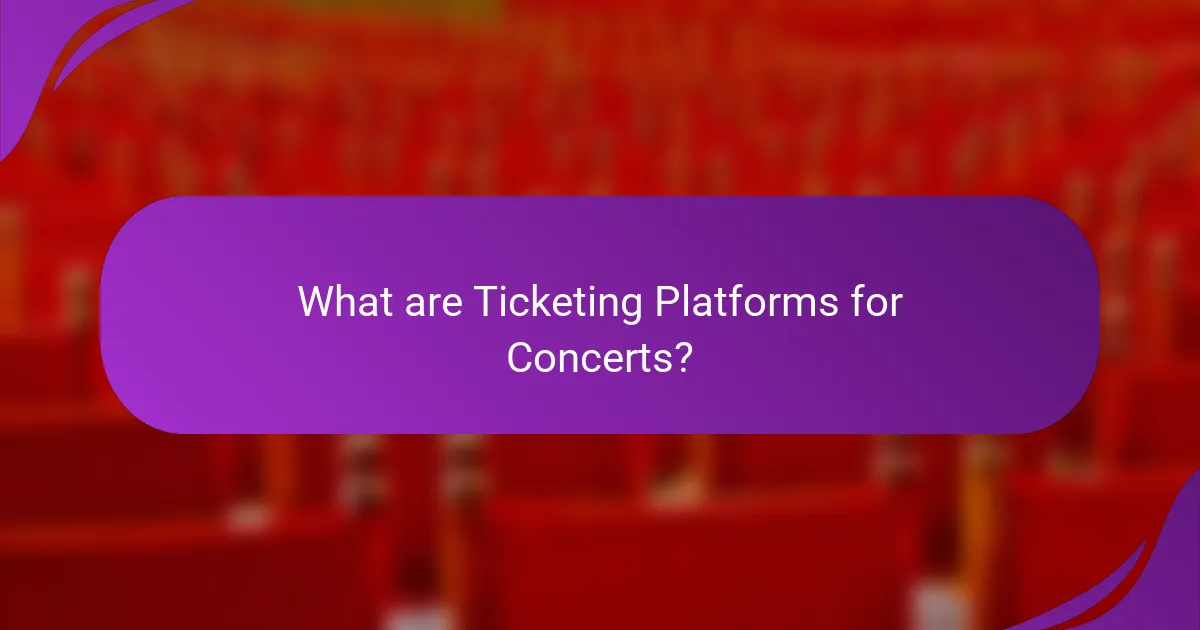
What are Ticketing Platforms for Concerts?
Ticketing platforms for concerts are online services that facilitate the sale and distribution of event tickets. These platforms enable users to browse events, purchase tickets, and receive electronic confirmations. They often include features such as seat selection, ticket pricing, and payment processing. Popular ticketing platforms include Ticketmaster, Eventbrite, and StubHub. These services streamline the ticketing process for both event organizers and attendees. They provide real-time updates on ticket availability and pricing. Additionally, many platforms offer promotional tools for event marketing. This enhances visibility and sales potential for concert organizers.
How do Ticketing Platforms function in the concert industry?
Ticketing platforms serve as intermediaries between concert organizers and attendees. They facilitate the sale of tickets through online and mobile interfaces. Concert promoters upload event details and ticket availability to these platforms. Customers can browse events, select seats, and purchase tickets instantly. Payment processing is securely handled by the platform. Once purchased, tickets are often delivered digitally via email or mobile apps. This system enhances convenience for both organizers and attendees. According to Statista, the global online ticketing market is projected to reach $68 billion by 2025, indicating significant growth in this sector.
What technology underpins the operation of Ticketing Platforms?
Ticketing platforms operate primarily on web-based technologies and databases. They utilize cloud computing to manage large volumes of ticket sales and user data. APIs facilitate integration with various payment gateways for secure transactions. Mobile applications enhance user experience by allowing ticket purchases on smartphones. Additionally, data analytics tools are used to track user behavior and optimize sales strategies. Blockchain technology is emerging for secure ticket verification and to prevent fraud. These technologies collectively ensure efficient ticket distribution and management in the concert industry.
How do Ticketing Platforms manage ticket inventory?
Ticketing platforms manage ticket inventory through automated systems that track and allocate tickets in real time. These platforms integrate with event organizers to receive data on ticket availability and sales. They utilize algorithms to optimize inventory based on demand and sales patterns. This ensures that tickets are allocated efficiently across various sales channels. Real-time updates prevent overselling and maintain accurate inventory levels. Reports and analytics help platforms forecast demand for future events. The integration with payment systems allows for immediate updates upon ticket purchase. This systematic approach enhances the overall ticketing experience for consumers and organizers alike.
What are the key features of Ticketing Platforms?
Ticketing platforms have several key features that enhance the event ticketing process. These platforms typically offer user-friendly interfaces for easy navigation. They provide secure payment processing to protect customer data. Ticketing platforms often include real-time inventory management to track ticket availability. They also support various ticket types, including general admission and VIP options. Many platforms offer promotional tools for marketing events effectively. Additionally, they provide analytics and reporting features to track sales performance. Customer support is also a critical feature, assisting users with inquiries and issues. These features collectively improve the overall experience for both event organizers and attendees.
How do Ticketing Platforms ensure secure transactions?
Ticketing platforms ensure secure transactions through encryption technologies and secure payment gateways. They utilize SSL (Secure Socket Layer) certificates to encrypt data during transmission. This encryption protects sensitive information like credit card details from unauthorized access. Additionally, ticketing platforms often implement two-factor authentication for user accounts. This adds an extra layer of security by requiring a second form of verification. Many platforms also monitor transactions for fraudulent activity in real-time. They employ algorithms to detect unusual patterns that may indicate fraud. Regular security audits further enhance their protection measures. These practices collectively help maintain a secure transaction environment for users.
What tools do Ticketing Platforms provide for event organizers?
Ticketing platforms provide various tools for event organizers. These tools include ticket sales management systems. They allow organizers to create, manage, and sell tickets online. Many platforms offer real-time analytics and reporting features. This helps organizers track ticket sales and audience engagement. Payment processing solutions are also included. They enable secure transactions for ticket purchases. Marketing tools are often available as well. These tools assist in promoting events through email campaigns and social media. Customer support features help organizers manage inquiries and issues efficiently. Overall, these tools streamline the event planning and execution process for organizers.
Why are Ticketing Platforms important for concert-goers?
Ticketing platforms are crucial for concert-goers because they provide a streamlined, efficient way to purchase tickets. They offer real-time availability, allowing fans to secure their spots instantly. Many platforms also feature user-friendly interfaces that simplify the buying process. Additionally, ticketing platforms often provide essential information about events, such as dates, venues, and lineups. They enhance security by offering verified ticket sales, reducing the risk of fraud. Furthermore, platforms may offer mobile ticketing options, making entry to events more convenient. According to a 2022 report by Statista, 70% of concert-goers prefer purchasing tickets online. This highlights the growing reliance on these platforms for accessing live music experiences.
How do Ticketing Platforms enhance the purchasing experience?
Ticketing platforms enhance the purchasing experience by offering user-friendly interfaces and streamlined processes. They provide real-time availability of tickets, allowing customers to see what is currently on offer. These platforms often feature secure payment options, which increase consumer trust during transactions. Additionally, ticketing platforms frequently offer mobile access, enabling users to purchase tickets anytime and anywhere. Many platforms also provide personalized recommendations based on user preferences and past purchases. Furthermore, they often include features such as seat selection and interactive seating charts. According to a study by Eventbrite, 70% of users prefer platforms that simplify the buying process. This data underscores the importance of convenience in enhancing the overall purchasing experience.
What benefits do Ticketing Platforms offer to fans?
Ticketing platforms offer fans a streamlined way to purchase tickets for concerts. They provide real-time access to ticket availability and pricing. Fans can compare options across multiple events easily. Many platforms offer mobile ticketing, allowing for convenient entry. They often include features like seat selection to enhance the experience. Additionally, ticketing platforms may offer exclusive deals and promotions. Some platforms provide fan-to-fan resale options for sold-out events. They also enable fans to receive alerts for upcoming shows and ticket releases.
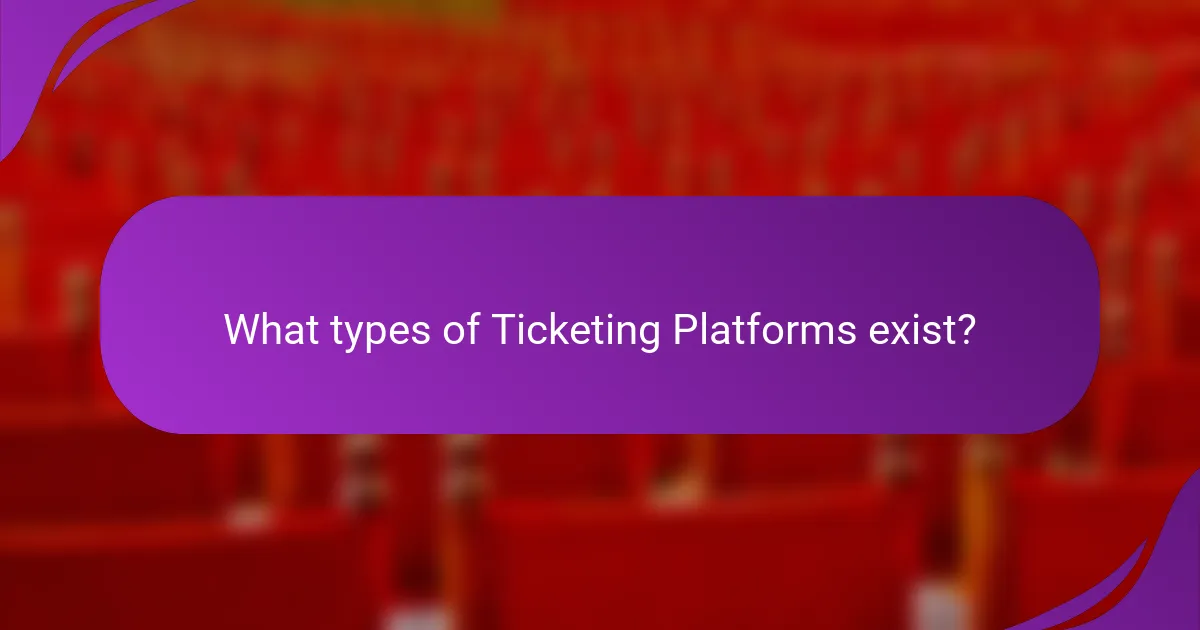
What types of Ticketing Platforms exist?
There are several types of ticketing platforms available for concerts. These include primary ticketing platforms, secondary ticketing platforms, and mobile ticketing platforms. Primary ticketing platforms sell tickets directly from the event organizers. Examples include Ticketmaster and Live Nation. Secondary ticketing platforms allow users to buy and sell tickets from other individuals. Examples include StubHub and Viagogo. Mobile ticketing platforms focus on ticket purchases through mobile devices. Examples include Eventbrite and SeatGeek. Each type serves different needs in the ticketing ecosystem.
How do primary and secondary ticketing platforms differ?
Primary ticketing platforms sell tickets directly from the event organizers to consumers. They typically offer tickets at face value and are authorized by the event promoters. Secondary ticketing platforms, on the other hand, allow individuals to resell tickets they have purchased. Prices on these platforms can vary and may exceed face value due to demand. The primary market ensures ticket authenticity and provides a secure purchasing process. In contrast, the secondary market may involve risks of counterfeit tickets and fluctuating prices based on market dynamics.
What are the advantages of using primary ticketing platforms?
Primary ticketing platforms streamline the ticket purchasing process for events. They provide a centralized location for buyers to access tickets in real-time. This reduces confusion and enhances user experience. Additionally, primary platforms often offer secure payment methods, protecting consumer data. They also facilitate easy ticket transfers and refunds, increasing customer satisfaction. According to a report by Statista, over 60% of concertgoers prefer purchasing tickets through official platforms for reliability. This preference underscores the trust consumers place in primary ticketing systems.
What are the risks associated with secondary ticketing platforms?
Secondary ticketing platforms carry several risks. These risks include the possibility of purchasing counterfeit tickets. Many users have reported receiving fake tickets, leading to denied entry at events. Additionally, prices on secondary platforms can be significantly inflated. This markup can result in consumers paying much more than face value. There is also a lack of consumer protection. Many platforms do not guarantee refunds or exchanges for tickets. Furthermore, the legality of resale varies by location. Some jurisdictions have strict laws governing ticket resale, which can lead to legal issues for buyers. Lastly, personal data security is a concern. Users may be at risk of identity theft if platforms do not have robust security measures.
What are popular examples of Ticketing Platforms?
Popular examples of ticketing platforms include Ticketmaster, Eventbrite, and StubHub. Ticketmaster is one of the largest ticket sales and distribution companies globally. It offers a wide range of events, including concerts and sports. Eventbrite is known for its user-friendly interface and is popular for local events and festivals. StubHub specializes in resale tickets, allowing users to buy and sell tickets for various events. These platforms are widely used for their extensive reach and convenience in purchasing tickets.
How do major platforms like Ticketmaster and Eventbrite operate?
Major platforms like Ticketmaster and Eventbrite operate by facilitating the sale and distribution of event tickets. Ticketmaster acts as a primary ticketing service for venues and promoters, managing inventory and pricing. They offer features like ticket resale and dynamic pricing based on demand. Eventbrite focuses on event organizers, allowing them to create, promote, and sell tickets for various events. It provides tools for event management and analytics. Both platforms charge service fees to users, generating revenue through ticket sales. Ticketmaster reported handling over 500 million tickets annually, showcasing its extensive reach. Eventbrite has processed over 200 million tickets since its inception, underscoring its popularity among event creators.
What niche platforms cater to specific concert genres?
Niche platforms catering to specific concert genres include Bandsintown, Songkick, and JamBase. Bandsintown focuses on connecting fans with live music events across various genres. It allows users to track their favorite artists and receive notifications about upcoming concerts. Songkick specializes in indie and alternative music. It offers personalized concert recommendations based on user preferences. JamBase is dedicated to the jam band scene, providing information on related concerts and festivals. These platforms enhance the concert experience by targeting specific music interests.
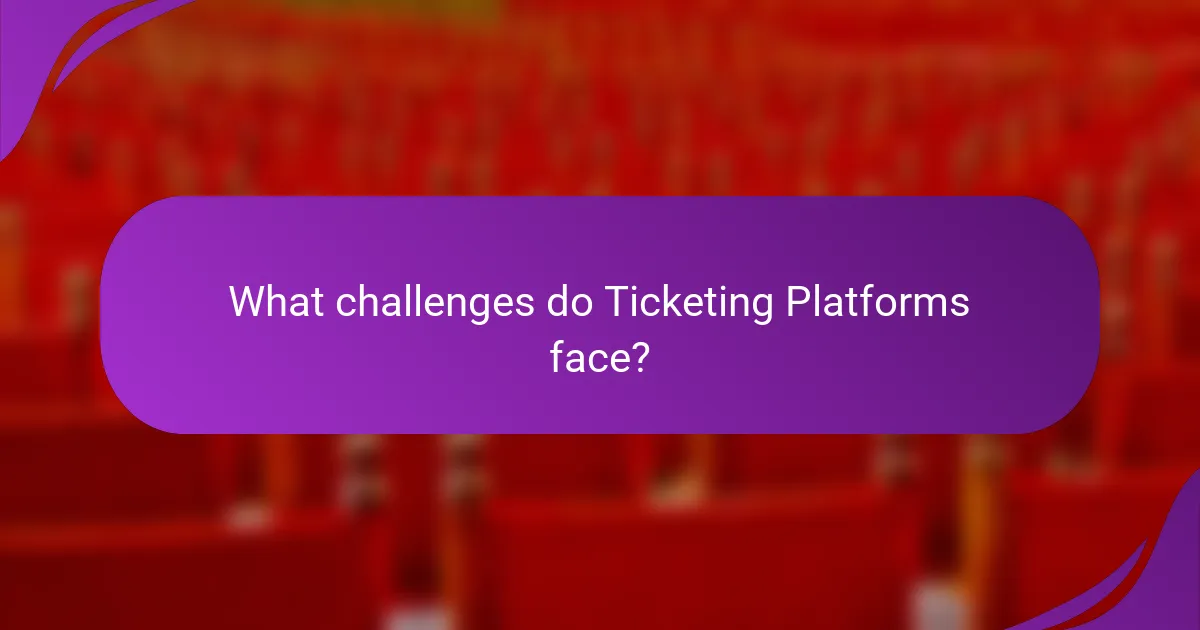
What challenges do Ticketing Platforms face?
Ticketing platforms face several significant challenges. One major challenge is ticket fraud, which can undermine consumer trust. According to a report by the Better Business Bureau, ticket fraud costs consumers millions annually. Another challenge is competition among platforms, which often leads to price wars and reduced profit margins. Additionally, managing high traffic during ticket sales can result in website crashes, frustrating users. Regulatory compliance poses another challenge, as laws vary by region and can affect operations. Lastly, ensuring a seamless user experience across devices is crucial, as many consumers purchase tickets on mobile devices. These challenges require ongoing adaptation and innovation from ticketing platforms.
How do issues like ticket scalping impact Ticketing Platforms?
Ticket scalping negatively impacts ticketing platforms by undermining fair access to events. Scalpers purchase tickets in bulk, often using automated bots. This practice drives up prices and creates scarcity for genuine fans. As a result, ticketing platforms face backlash from customers. They may also experience decreased trust and loyalty from users. In response, many platforms implement anti-scalping measures. These measures include CAPTCHA systems and purchase limits. Such actions aim to ensure equitable ticket distribution. Consequently, ticketing platforms must continuously adapt to combat scalping effectively.
What measures are being taken to combat ticket scalping?
Legislation is being enacted to combat ticket scalping. Various jurisdictions are implementing laws that restrict the resale of tickets above face value. Some states have also mandated that ticket sellers disclose the original price. Technology is being utilized to create secure ticketing systems. These systems often include unique identifiers for each ticket. Many platforms are now employing digital ticketing to limit unauthorized transfers. Verified fan programs are being introduced to ensure genuine buyers have access. These measures collectively aim to protect consumers and maintain fair pricing.
How do technological advancements address these challenges?
Technological advancements enhance ticketing platforms by improving efficiency and user experience. They streamline the ticket purchasing process through automated systems. Mobile apps allow users to buy tickets instantly from anywhere. Data analytics help platforms predict demand and set optimal pricing. Blockchain technology increases transparency and reduces fraud in ticket sales. Virtual reality provides immersive previews of events, attracting more customers. These innovations address common challenges like ticket scalping and accessibility issues. Statistics show that platforms using advanced technology see a 30% increase in customer satisfaction.
What are the future trends in Ticketing Platforms?
Future trends in ticketing platforms include increased adoption of blockchain technology. Blockchain enhances transparency and security in ticket transactions. It also helps to combat fraud by verifying ticket authenticity. Another trend is the integration of artificial intelligence for personalized recommendations. AI can analyze user behavior to suggest events that match individual preferences. Mobile ticketing continues to rise in popularity, allowing users to access tickets conveniently on their devices. Additionally, dynamic pricing models are becoming more common. These models adjust ticket prices based on demand and market conditions. Social media integration is also a growing trend. It enables better promotion and easier sharing of events among users. Finally, sustainability practices are gaining traction. Ticketing platforms are exploring eco-friendly options to appeal to environmentally conscious consumers.
How is mobile ticketing changing the concert experience?
Mobile ticketing is transforming the concert experience by enhancing convenience and security. Attendees can purchase and store tickets on their smartphones. This reduces the need for physical tickets, minimizing the risk of loss or theft. Mobile ticketing also streamlines entry processes, as fans can simply scan their phones at the venue. According to a 2022 study by Eventbrite, 75% of concertgoers prefer mobile tickets for their ease of use. Additionally, mobile ticketing allows for real-time updates regarding event changes or delays. This immediate communication improves overall attendee satisfaction. Ultimately, mobile ticketing modernizes the concert experience, making it more efficient and user-friendly.
What role does data analytics play in the evolution of Ticketing Platforms?
Data analytics plays a crucial role in the evolution of ticketing platforms. It enables platforms to analyze customer behavior and preferences. This analysis helps in personalizing marketing strategies. Ticketing platforms can optimize pricing based on demand forecasting. Data analytics also improves inventory management by predicting ticket sales trends. Additionally, it enhances user experience through targeted recommendations. According to a report by Statista, the global ticketing market is expected to reach $68 billion by 2026, highlighting the importance of data-driven decisions. Thus, data analytics is integral to the growth and efficiency of ticketing platforms.
What tips can enhance the use of Ticketing Platforms?
Utilizing ticketing platforms effectively can significantly improve user experience and sales. First, ensure the platform is user-friendly. A straightforward interface encourages ticket purchases. Second, optimize for mobile devices. Statistics show that over 50% of ticket sales occur via mobile. Third, integrate social media sharing options. This can enhance visibility and attract more attendees. Fourth, offer various payment options. Flexibility in payment methods increases conversion rates. Fifth, utilize analytics tools. These tools provide insights into customer behavior and preferences. Lastly, maintain clear communication with customers. Timely updates about events build trust and enhance satisfaction.
How can concert-goers secure the best tickets using these platforms?
Concert-goers can secure the best tickets by using various ticketing platforms effectively. First, they should create accounts on multiple platforms to access exclusive pre-sales. Many platforms offer early access to tickets for registered users. Second, setting up alerts for specific events can notify users when tickets become available. Third, using mobile apps can provide quicker access to tickets than desktop sites. Fourth, concert-goers should be ready to purchase as soon as tickets are released, as popular events sell out quickly. Lastly, comparing prices across different platforms ensures they get the best deal. These strategies enhance the chances of securing desirable tickets.
What should event organizers consider when choosing a Ticketing Platform?
Event organizers should consider several key factors when choosing a ticketing platform. First, the platform’s user interface should be intuitive for both organizers and attendees. A complicated interface can lead to customer frustration and lost sales. Second, the platform should offer robust customer support. Reliable support can resolve issues quickly during critical sales periods. Third, organizers need to evaluate transaction fees. High fees can significantly reduce profit margins. Fourth, integration capabilities with other tools are essential. A platform that integrates with marketing and CRM tools can streamline operations. Fifth, data analytics features are crucial. These features provide insights into sales trends and customer behavior. Sixth, mobile accessibility is important. Many attendees purchase tickets via mobile devices, so a mobile-friendly platform is necessary. Lastly, security measures must be robust. Protecting customer data is essential to maintain trust and comply with regulations.
Ticketing platforms for concerts are online services that facilitate the sale and distribution of event tickets, offering features such as seat selection, payment processing, and real-time inventory management. This article provides an overview of how these platforms function within the concert industry, the technology that underpins their operation, and the various types available, including primary and secondary platforms. Key features, security measures, and tools for event organizers are discussed, along with the importance of ticketing platforms for concert-goers. Additionally, the article addresses challenges faced by these platforms, future trends, and tips for both users and organizers to enhance their ticketing experience.
